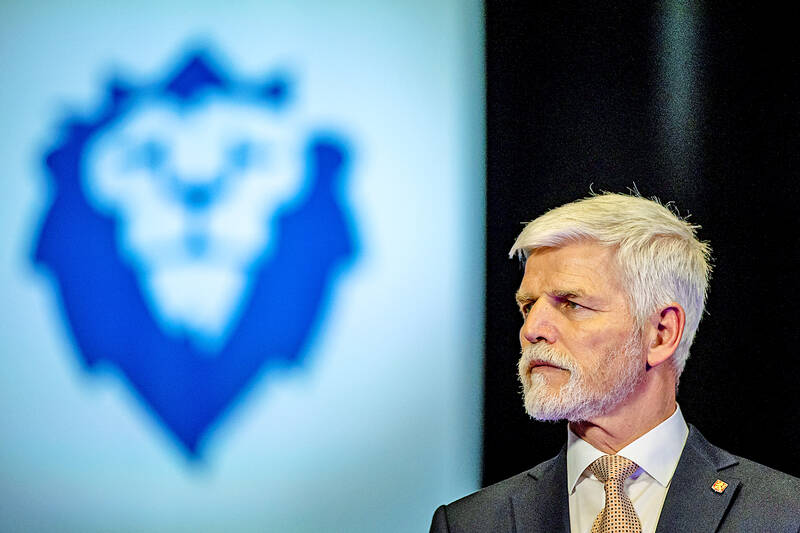Czech president-elect Petr Pavel on Tuesday defended his decision to have a telephone conversation with President Tsai Ing-wen (蔡英文) a day earlier despite objections from China, saying that the Czech Republic is a sovereign state and “we do what we think is right.”
In a Czech-language post on Twitter, Pavel wrote that he understood China had “reservations” about the phone call.
“However, we are a sovereign country and we do what we think is right,” he added.

Photo: EPA-EFE
Pavel, a retired general and former chairman of NATO’s military committee, the alliance’s highest military body, swept to the Czech presidency after a landslide victory on Saturday over former Czech prime minister Andrej Babis.
He is to replace Czech President Milos Zeman, whose second term ends next month.
Unlike Zeman, who pushed for closer relations with China and Russia, Pavel is considered a mainstream pro-Western candidate who backs aid for Ukraine.
The previous time Tsai publicly announced a phone call with a leader of a nation that does not have formal diplomatic ties with Taiwan was on Dec. 2, 2016, with then-US president-elect Donald Trump.
Pavel’s post on Twitter was made after Beijing on Tuesday condemned Prague over the Tsai-Pavel call.
“Czech president-elect Pavel ignored China’s repeated attempts to dissuade him and our repeated representations,” Chinese Ministry of Foreign Affairs spokeswoman Mao Ning (毛寧) told reporters.
“He has persisted in stepping on China’s red line, seriously interfering in China’s domestic affairs and hurting the feelings of the Chinese people,” Mao said.
“Before his election, Pavel publicly stated that the ‘one China’ principle should be respected, yet now he has gone back on his words,” she said. “China once again urges the Czech Republic to ... take immediate and effective measures to eliminate the negative impact of this incident and avoid irreparable damage to China-Czech relations.”
Meanwhile, Czech Prime Minister Petr Fiala on Tuesday said the Czech Republic maintains its “one China” policy, despite having good relations with Taiwan.
“Czechia respects and holds its own one-China policy,” Fiala said in a statement. “As a sovereign country we decide ourselves who we have calls with and who we will meet.”
The president of the Czech Republic is the head of state, but has mostly ceremonial powers, with the day-to-day business of the executive government carried out by the prime minister.
In related news, EU spokeswoman for foreign affairs and security policy Nabila Massrali on Tuesday reiterated the bloc’s stance on Taiwan and China.
“The EU and its member states remain committed to the long-standing ‘one China’ policy, which constitutes the framework for the EU’s and its member states’ engagement with Taiwan,” Massrali told a news briefing.
“Within this policy, the EU and its member states recognize the government of the People’s Republic of China as the sole government of China,” she said. “At the same time the EU and its member states have strong ties with Taiwan, an important economic and high-tech partner in the region.”

ENDEAVOR MANTA: The ship is programmed to automatically return to its designated home port and would self-destruct if seized by another party The Endeavor Manta, Taiwan’s first military-specification uncrewed surface vehicle (USV) tailor-made to operate in the Taiwan Strait in a bid to bolster the nation’s asymmetric combat capabilities made its first appearance at Kaohsiung’s Singda Harbor yesterday. Taking inspiration from Ukraine’s navy, which is using USVs to force Russia’s Black Sea fleet to take shelter within its own ports, CSBC Taiwan (台灣國際造船) established a research and development unit on USVs last year, CSBC chairman Huang Cheng-hung (黃正弘) said. With the exception of the satellite guidance system and the outboard motors — which were purchased from foreign companies that were not affiliated with Chinese-funded

PERMIT REVOKED: The influencer at a news conference said the National Immigration Agency was infringing on human rights and persecuting Chinese spouses Chinese influencer “Yaya in Taiwan” (亞亞在台灣) yesterday evening voluntarily left Taiwan, despite saying yesterday morning that she had “no intention” of leaving after her residence permit was revoked over her comments on Taiwan being “unified” with China by military force. The Ministry of the Interior yesterday had said that it could forcibly deport the influencer at midnight, but was considering taking a more flexible approach and beginning procedures this morning. The influencer, whose given name is Liu Zhenya (劉振亞), departed on a 8:45pm flight from Taipei International Airport (Songshan airport) to Fuzhou, China. Liu held a news conference at the airport at 7pm,

Authorities yesterday elaborated on the rules governing Employment Gold Cards after a US cardholder was barred from entering Taiwan for six years after working without a permit during a 2023 visit. American YouTuber LeLe Farley was barred after already being approved for an Employment Gold Card, he said in a video published on his channel on Saturday. Farley, who has more than 420,000 subscribers on his YouTube channel, was approved for his Gold Card last month, but was told at a check-in counter at the Los Angeles International Airport that he could not enter Taiwan. That was because he previously participated in two

SECURITY RISK: If there is a conflict between China and Taiwan, ‘there would likely be significant consequences to global economic and security interests,’ it said China remains the top military and cyber threat to the US and continues to make progress on capabilities to seize Taiwan, a report by US intelligence agencies said on Tuesday. The report provides an overview of the “collective insights” of top US intelligence agencies about the security threats to the US posed by foreign nations and criminal organizations. In its Annual Threat Assessment, the agencies divided threats facing the US into two broad categories, “nonstate transnational criminals and terrorists” and “major state actors,” with China, Russia, Iran and North Korea named. Of those countries, “China presents the most comprehensive and robust military threat